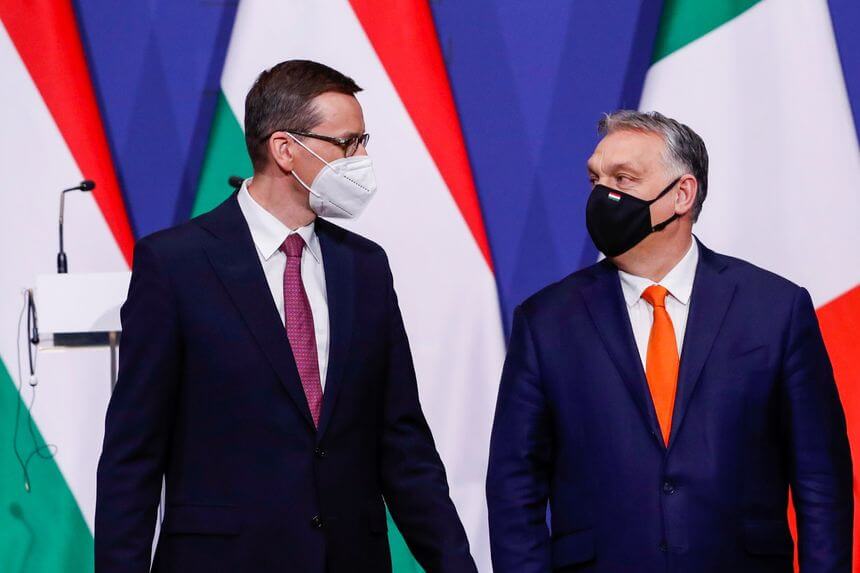On Tuesday, Hungarian Justice Minister Judith Varga said the alliance between Poland and Hungary represents “common sense” in the European Union (EU).
In a virtual address to around 150 students at the Summer University in Krasiczyn, southern Poland, the Minister noted that the relationship between the two nations is “unparalleled in European history” and urged the youth to engage in critical and reflexive discussions on the bloc’s future.
Referring to the ongoing anxieties between the two nations and the EU, Varga said it was time for Poland and Hungary to “say no to deepening integration and remind the rest of the bloc that the principle of the rule of law cannot be used as a tool for political blackmail.”
The Minister stressed that the EU needs constructive and sound dialogue and encouraged the youth, set to be the “future of the EU,” to guard their values moving ahead.
Varga’s remarks came amid growing divisive sentiments within the bloc, particularly with regards to Poland and Hungary’s collective discord with the EU regarding legal changes by both countries. The Union views these changes as a violation of the bloc’s core values, weakening judicial independence, and breaching human rights.
In July 2020, the European Commission mentioned these violations in its second annual report. Subsequently, it launched an infringement procedure against the newly adopted provisions by both nations that jeopardise the rule of law.
One of the provisions reportedly prohibits and discriminates against LGBTQ persons. In this regard, the report highlighted that Hungarian law limits access to content that “promotes or portrays the so-called divergence from self-identity corresponding to sex at birth, sex change or homosexuality for individuals under 18” and restricts LGBTQ content for children within the education system. The report also stated that Poland “failed to fully and appropriately respond to its inquiry regarding the nature and impact of [its] so-called LGBT-ideology free zones.”
Moreover, the report demanded judicial reform in both countries and a more decisive effort to combat corruption, terming the situation “highly problematic.”
The Commission also provided two months for both countries to respond to the report and stated that failure to do so would lead to a retraction of funds. Both nations are among the biggest net recipients of European money. With this report, the Commission moved beyond dialogue to action, threatening to impose financial sanctions.
However, Poland and Hungary have defended their stance on the rule of law, claiming that “the pressure from Brussels represents an ideological attack on their values and an attempt by unelected officials to curtail the rights of member countries to shape their political systems and laws.”
Responding to the report, Poland’s Deputy Justice Minister, Sebastian Kaleta, called for terminating dialogue with the Commission. “The European Commission is acting in bad faith, violating EU rules, and ignoring the Polish constitutional system,” he said. Likewise, Polish government spokesperson Piotr Müller and Polish lawmakers claimed that the report was “intervening in Polish law” and stated that the Warsaw government would examine the new documents from Brussels and “conduct an appropriate dialogue with the European Commission.”
The Commission also instructed Hungary to abide by the rule of law and the ethos of the Commission, generating extensive judicial and press reform. In a Facebook post in July, Varga called the report “biased, politically motivated, and factually weak...a weak reproduction, without reservation, of the opinions of non-governmental organisations with a negative attitude towards our homeland and a means of blackmailing Hungary.”
Recently, the EU decided to link approval of new EU funds to the rule of law to accelerate Poland and Hungary’s compliance with the Commission’s report. It remains to be seen how the two nations respond to the development.
Poland and Hungary Represent Common Sense in EU: Hungarian Justice Minister Varga
Hungarian Justice Minister Judith Varga stated that Poland and Hungary represent “common sense” in the European Union, as tensions prevail within the bloc.
August 27, 2021

Polish Prime Minister Mateusz Morawiecki, left, and his Hungarian counterpart, Viktor Orbán, at a meeting in Budapest in April. SOURCE: BERNADETT SZABO/REUTERS
